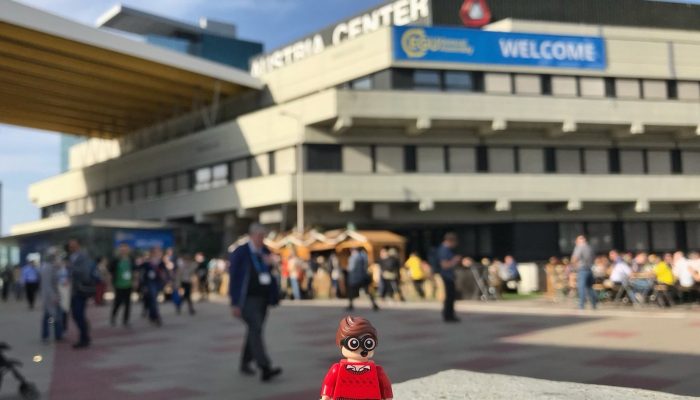
The prospect of attending a large international conference during your PhD can be really daunting, especially if you’re only in your second year and in the early stages of data collection. That’s why I hadn’t planned on going to one until my third year. But thanks to winning some travel funds, this time last year I was preparing to attend the EGU General Assembly 2018 in Vienna, a scary but exciting opportunity that I am so glad I took.
I received lots of great advice before I went, but also found out things when I was there that I wish I had known in advance. So here is my list of do’s and dont’s for attending your first General Assembly.
DO
Go on fieldtrips and events.
In 2018 the EGU Geochemistry, Mineralogy, Petrology & Volcanology (GMPV) Division organised a pre-conference fieldtrip to the Bohemian Massif in Austria, specifically targeted towards early career researchers. Not being the type to pass up a chance to get into the field, I signed up right away. This was a great opportunity to get to meet new people, and not long after we bundled into minibuses and started driving into the Austrian countryside we were chatting away pleasantly.
Making friends before the conference means that you have a big group of friendly faces that you know when you’re at the conference, a vital crutch when giving presentations!
There was also a GMPV mid-conference social event, involving what else but tango lessons! Even though I didn’t get up and dance myself, it was a fun and interesting event and another good way to meet other researchers.
To find out about such events you can look for pre/post conference workshops in the session programme, keep an eye on the division social media accounts, and make use of the resources available for early career researchers both before and at the conference itself.
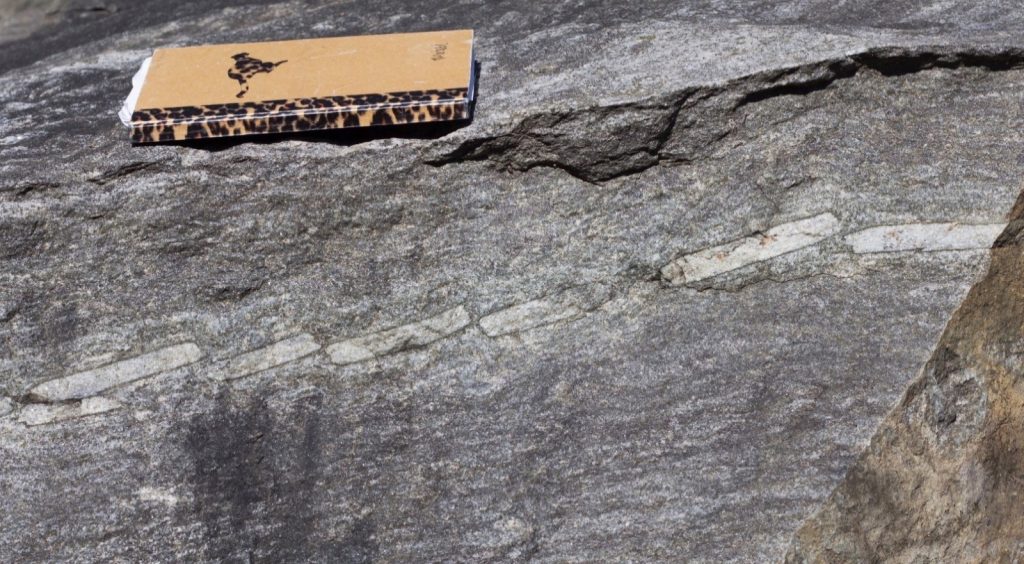
Excellent example of domino boudinage on show near Spitz, during the pre-conference fieldtrip on “Deformation in the lower crust”. (Credit: Stacy Phillips)
DON’T
Be scared to talk to people at their posters.
It still takes a little time for me to stop feeling anxious and go up to people at their posters, especially if they’re eminent researchers. One way to calm the nerves is to find a poster you are interested in that already has someone there and tag along in their discussion. This gives you a little time to read the poster and decide if you want to ask a question. You could also just ask a presenter standing by their poster to give you a run-through of their work. Build up your confidence and you’ll be talking to the big-shots in no time!
DO
Sign up for the mentoring programme.
The hardest people to meet at the General Assembly are the well-established researchers in your field, but the EGU Mentoring Programme is a great way to get to those people. You are typically assigned to a mid-career researcher in your area, and you are encouraged to meet up with them at least at the Sunday Ice Breaker event and Monday morning planning meeting, if not continually throughout the week. I signed up for this and found it very helpful. Through my mentor I was introduced to lots of other people that I wouldn’t have met otherwise. Although we saw each other a number of times during the week as we were attending the same talks, I didn’t take full advantage of my mentor and I wish I had. So, sign up and chat to your mentor often! The deadline to register for the programme is 31 January.
DO
Plan what you want to go see.
The General Assembly mobile app is an essential scheduling tool. It’s really easy to use and it allows you to create your own personal programme by ‘starring’ events of interest. I also found it very helpful to have the list of abstracts on hand and see what presentations are coming up next when sitting in on a session. I highly recommend downloading it and sorting out your plan of attack in advance! EGU will be releasing the General Assembly mobile app closer to the conference, so stay tuned!
DON’T
Try and be in multiple places at once.
One disadvantage of creating your own programme through the app is that you end up ‘starring’ several talks only to then find out that you can’t see them all! If you plan to chop and change rooms, leaving one session to see a different talk and then coming back, it’s very possible those two rooms will be at opposite ends of the venue. And the conference centre is HUGE! Travel time between rooms should not be underestimated (hence why venue staff can be seen zipping about on scooters!). Also, given that it’s likely one of those sessions will be running a little ahead of time or late, chances are you won’t make all the talks you want to attend. Keep it simple and try to stay in one room at a time, or at least sit near the door and give yourself a couple of talks leeway so you don’t miss out on the science!
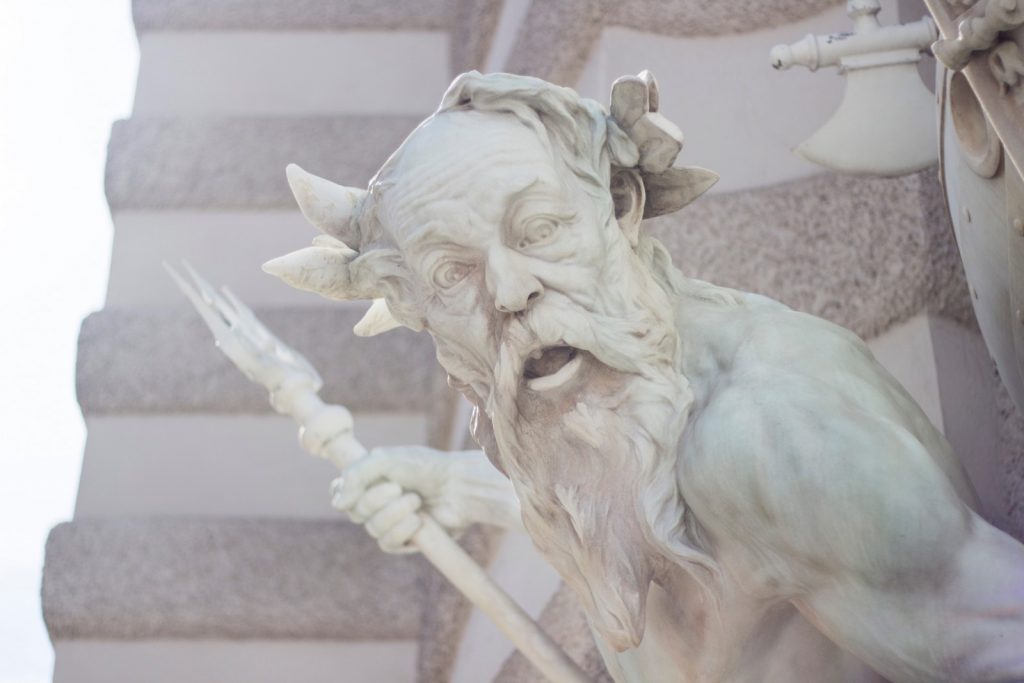
That feeling when you realise you’ve missed the talk you ran across the conference centre for… (Part of a water fountain in central Vienna). (Credit: Stacy Phillips)
DO
Go to something you wouldn’t normally go to.
If you find yourself with some spare time, you can use the General Assembly app to see what sessions and talks are happening at that moment. Go listen to a talk in a completely separate field; you’ll learn something new and see how different people give presentations! Get involved in something that you haven’t tried before. You could wander from a talk on metamorphic petrology, to a poster on the strength of oil-bearing reservoir rocks, to a geoscience-themed games night! The General Assembly has it all!
DON’T
Spend all your time at the conference centre.
A consistent piece of advice I received was to not spend the entire week at the conference centre. There will be days or mornings where there will be nothing relevant to you. So, take the chance to explore the wonderful city of Vienna! Go on a walking tour, experience an authentic Viennese coffee house, or visit one of the many museums. Then when you return to the conference you will be refreshed and ready to absorb more of the latest science EGU has to offer. And you’ll have a handy conversation starter! If you really can’t tear yourself away from the science though, go grab some food from the small supermarket at the venue and at least have lunch in the park!
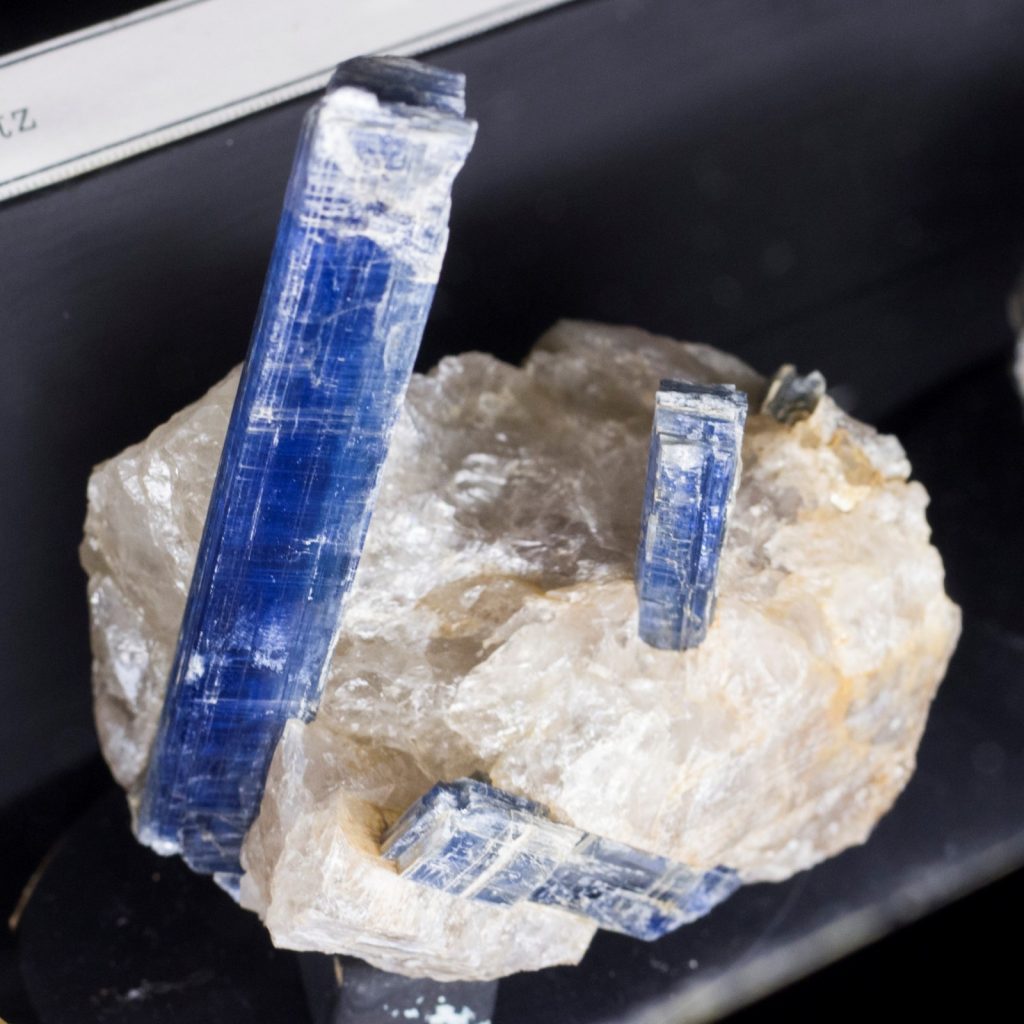
EGU attendees get reduced admission to Vienna Museum of Natural History, although we didn’t have time to make it out of the fossil and mineral section! Here’s a fabulous sample of kyanite, my favourite mineral! (Credit: Stacy Phillips)
DO
Make use of social media.
If social media is your thing, the #EGU19 conference hashtag is a great way to stay current with meeting updates as well as connect with people and find out about their work. There are lots of TV screens throughout the venue that have a live feed of the hashtag on Twitter, and seeing your tweet up there for a couple minutes of fame is pretty cool. It’s also really useful. My poster was on the Friday afternoon and I was worried that no one would be around to see it! So, I put up my poster early on the Friday morning, tweeted a photo of me next to it, and then stood by my poster whenever I had a free moment. Someone who I wanted to talk to but who wasn’t around for the poster session saw my tweet and found me. We had a really fruitful discussion, all because of one photo and 240 characters.
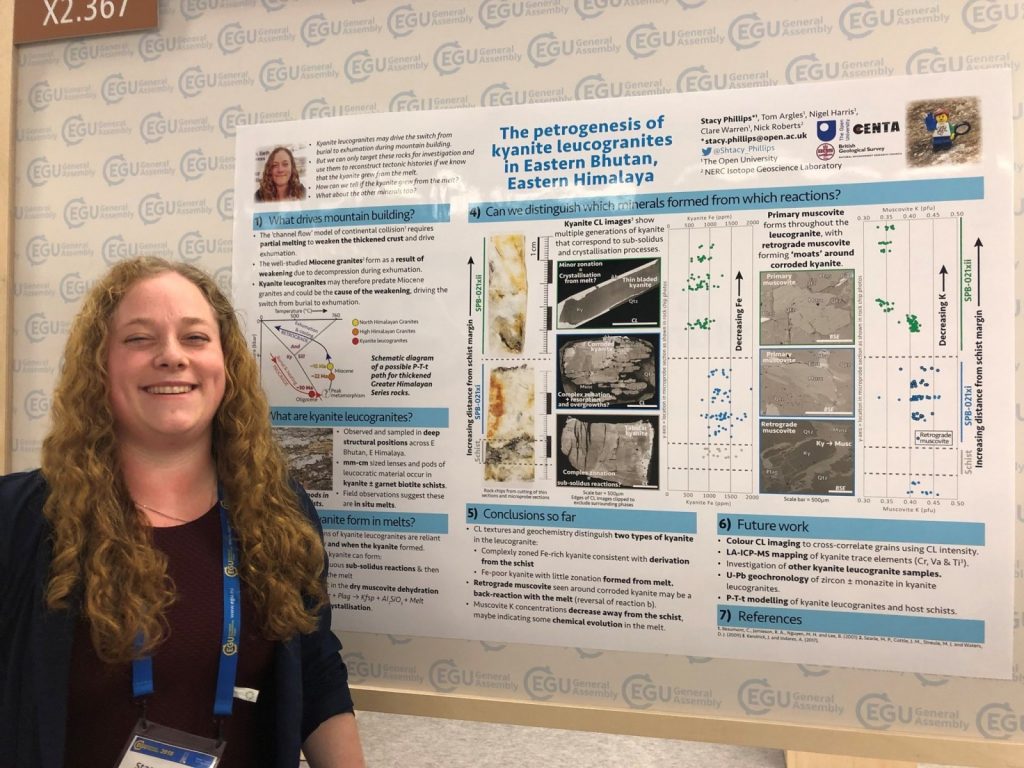
Presenting my poster was a lot of fun and a great opportunity to talk to people who could help guide my future work. (Credit: Stacy Phillips)
DO
Wear comfortable shoes.
I said above, I stood by my poster for most of the Friday. I was wearing comfortable shoes, but my feet were so sore the following day! (That may have also had something to do with the dancing at the conveners’ party…) You’ll be doing a lot of walking at the General Assembly and footwear is not something you should neglect!
DON’T
Bring big bulky bags.
You will be packing your bag each morning and convincing yourself that you need your laptop, your massive notebook and those papers you need to read. Sooner or later your bag will be bursting at the seams, and by the end of the day you’ll realise that you didn’t use any of the things you brought along. If you have and can make do with just your smartphone or a small tablet, then bring those (plus chargers!) and a small notebook (put in your name and details, in case you lose it).
DO
Bring a water bottle or reusable coffee cup.
Geoscientists should all be singing from a similar hymn sheet when it comes to saving the environment. So, it was great to see the abundant water fountains throughout the conference venue. Though I was surprised by the lack of re-usable coffee cups on show. There are regular coffee breaks to sustain everyone, and although there are recyclable bins where you can dispose of your cups, you could should just bring your own!
This is by no means an exhaustive list of things you should and shouldn’t do, and it doesn’t cover every aspect of what to expect at your first General Assembly, but hopefully it is a helpful guide. If you’re preparing for your first EGU meeting, you will probably be a little nervous, as I was this time last year. But I am confident that you’ll have a great week, talk about cutting-edge science, and make a wonderful array of connections, as I did in 2018. Good luck and feel free to ask questions or get in touch with me! You can find me on Twitter @Shtacy_Phillips. and do come say hi to me at EGU 2019!
by Stacy Phillips, PhD student at Open University, United Kingdom
Stacy Phillips is a 2nd year PhD student at the Open University. She is investigating the role of crustal melting in the Himalaya by looking at kyanite leucogranites from Bhutan, Eastern Himalaya. This involves a combination of petrology, geochemistry, geochronology and P-T modelling to understand how these melts formed. Her interests in science communication have led to the creation of the Fieldwork Diaries podcast and she is an avid user of Twitter (@Shtacy_Phillips) for science communication (and the odd rant about sports). When not busy doing or communicating science you can find her taking photos of Lego minifigures (on Instagram @ShtacyP).
EGU 2019 will take place from 07 to 12 April 2019 in Vienna, Austria. For more information on the General Assembly, see the EGU 2019 website and follow us on Twitter (#EGU19 is the official conference hashtag) and Facebook.

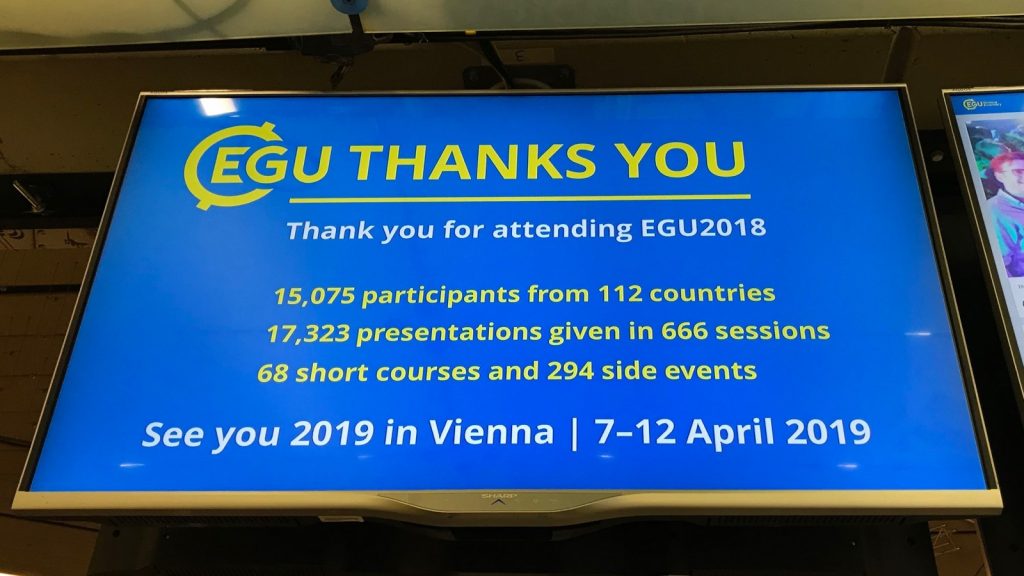
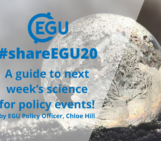
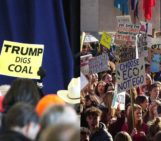
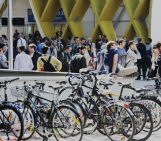
Dan Martin
Small one to add to the excelllent advice here, but don’t buy a week metro pass — it’s on your badge!
Elizaveta Kovaleva
Wow, really useful post, everything is to the point! Thanks!